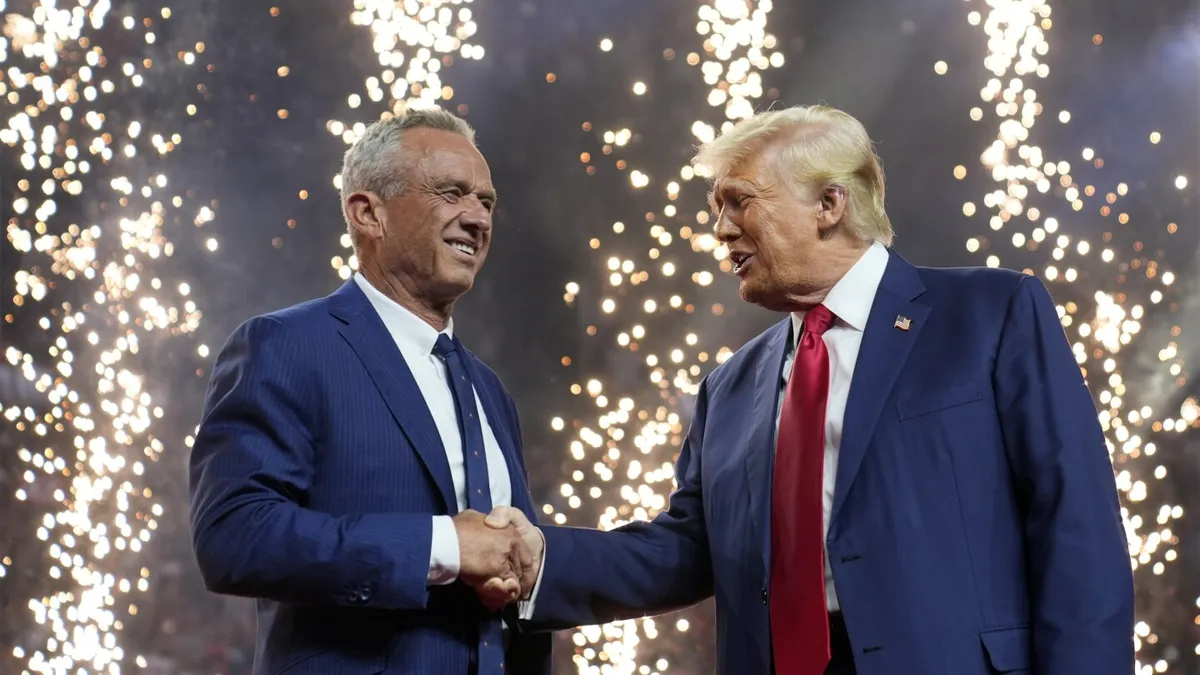
WASHINGTON (AP) — In a significant move, Robert F. Kennedy Jr. took the oath as President Donald Trump’s new health secretary on Thursday. Following a closely contested Senate vote, Kennedy now oversees a substantial $1.7 trillion federal budget, encompassing vaccine recommendations, food safety, and health insurance programs impacting nearly half of the nation's population.
The vote saw nearly all Republicans aligning with Trump despite concerns regarding Kennedy’s controversial stance on vaccines. The Senate confirmed him with a 52-48 vote, revealing a stark division as Democrats unanimously opposed the appointment. Notably, Kentucky Sen. Mitch McConnell, a childhood polio survivor, was the sole Republican dissent, citing his personal belief in the life-saving power of vaccines.
“I’m a survivor of childhood polio. In my lifetime, I’ve watched vaccines save millions of lives from devastating diseases across America and around the world,” McConnell emphasized, expressing his refusal to support any re-evaluation of established cures.
Shortly after his swearing-in, Kennedy announced in an interview with Fox News’ Laura Ingraham his intention to introduce a more rigorous program for monitoring vaccine side effects. The GOP largely supports Kennedy’s vision for the health department, particularly his focus on addressing chronic diseases like obesity.
Sen. Mike Crapo, R-Idaho, voiced his support, stating, “We’ve got to get into the business of making America healthy again.” He believes that Kennedy’s leadership will bring a “fresh perspective” to the office.
In the Oval Office, Kennedy was accompanied by his wife, family members, and several Congress members as Supreme Court Justice Neil Gorsuch officiated the ceremony. Reflecting on his family’s legacy, Kennedy shared memories of visiting the White House during his uncle, President John F. Kennedy’s tenure.
President Trump announced the formation of a new commission under Kennedy’s leadership to study chronic diseases. Kennedy, acknowledging Trump’s influence, described him as a “pivotal historical figure” and a blessing for the country.
Kennedy, aged 71, has long been in the national spotlight due to his family’s prominence and his outspoken views on food, chemicals, and vaccines. His audience expanded during the COVID-19 pandemic when he led a nonprofit organization that challenged vaccine manufacturers and questioned government health agencies.
Despite the controversy, Kennedy claims he is “uniquely positioned” to restore trust in public health agencies such as the Food and Drug Administration (FDA), the Centers for Disease Control and Prevention (CDC), and the National Institutes for Health (NIH).
Sen. Thom Tillis, R-N.C., expressed hope for Kennedy’s leadership in reducing healthcare costs and enhancing public health. However, Sen. Bill Cassidy, R-La., a doctor and Senate Health Committee leader, sought assurances from Kennedy regarding the stability of current vaccine recommendations.
During confirmation hearings, Democrats questioned Kennedy’s stance on the debunked theory linking vaccines to autism and raised concerns about potential conflicts of interest, given his financial ties to legal actions against vaccine manufacturers.
Kennedy assumes control during a period of significant federal restructuring, led by billionaire Elon Musk, affecting billions in public health funding and federal employment stability. The NIH recently announced a cap on medical research funding for universities, impacting disease treatment development.
Kennedy has advocated for staffing changes at the NIH, FDA, and CDC, promising to remove personnel responsible for misguided decisions on nutrition and Alzheimer’s treatment. “I have a list in my head,” Kennedy disclosed regarding potential firings.